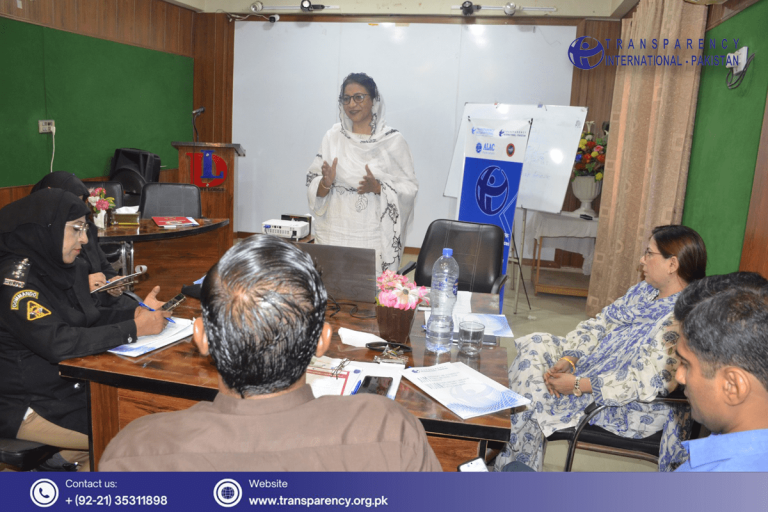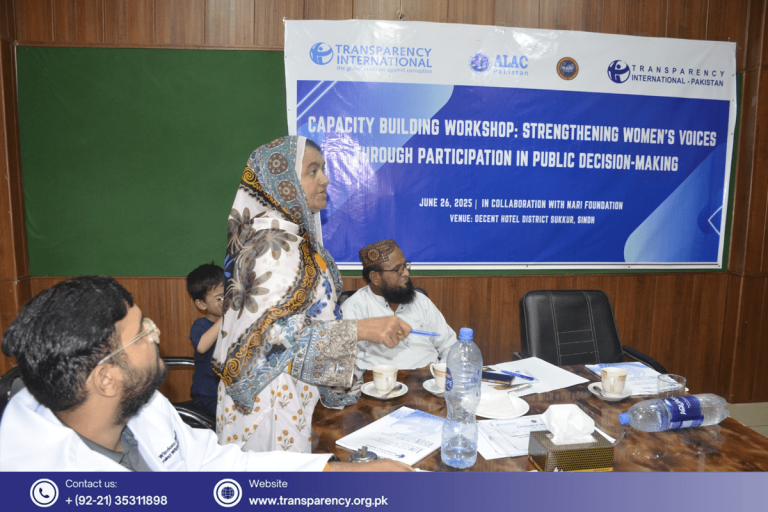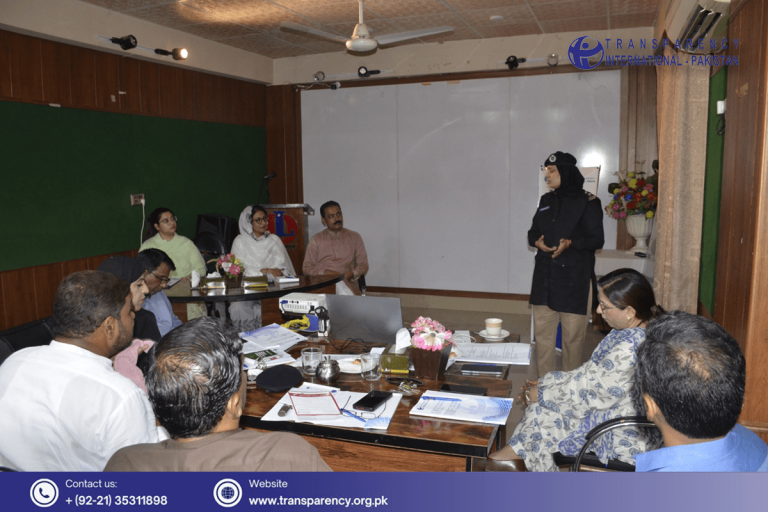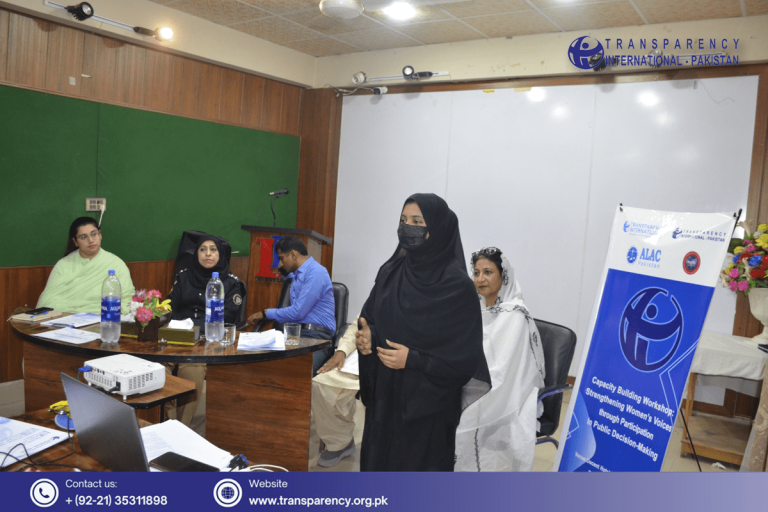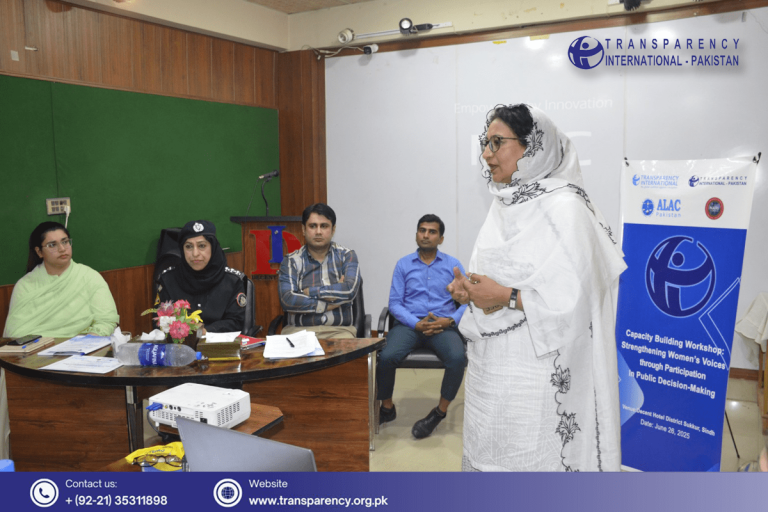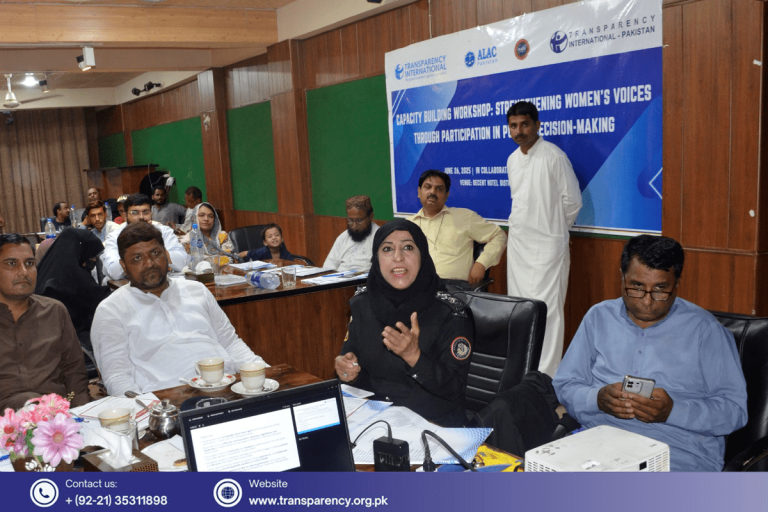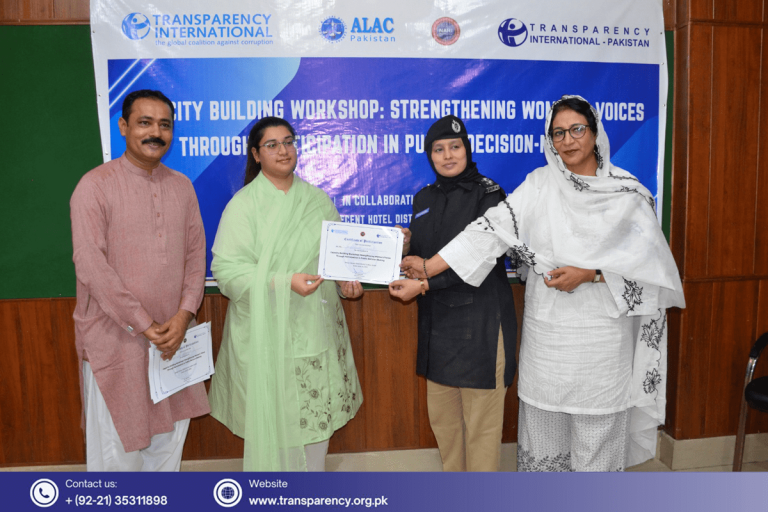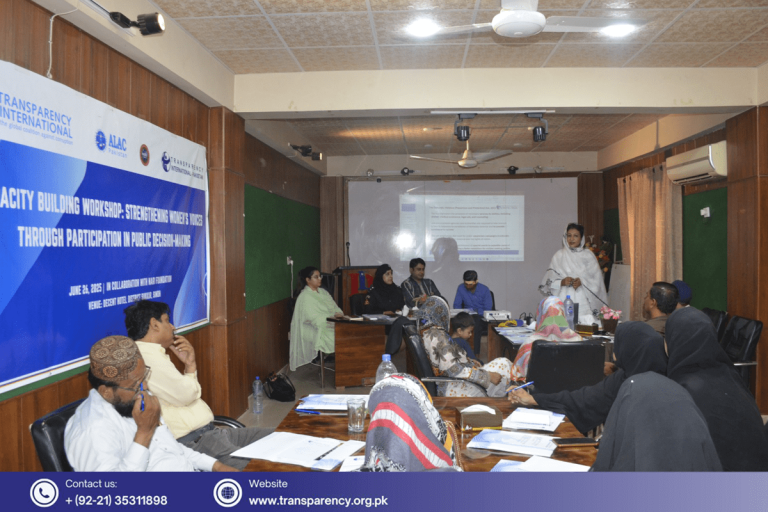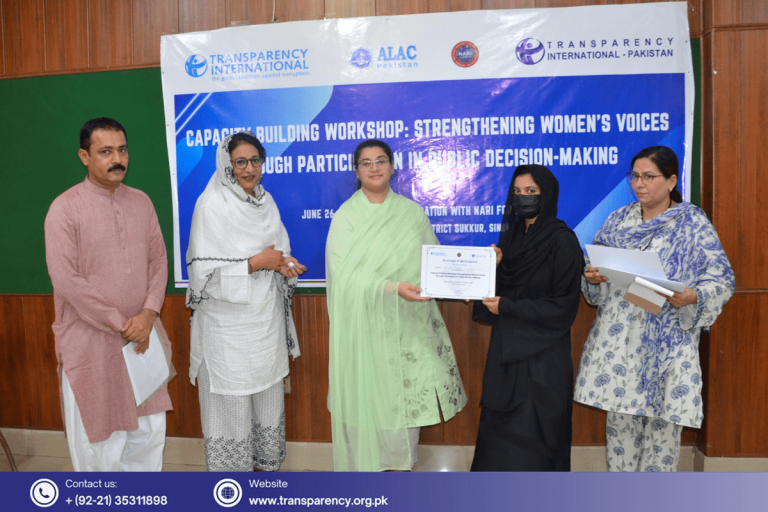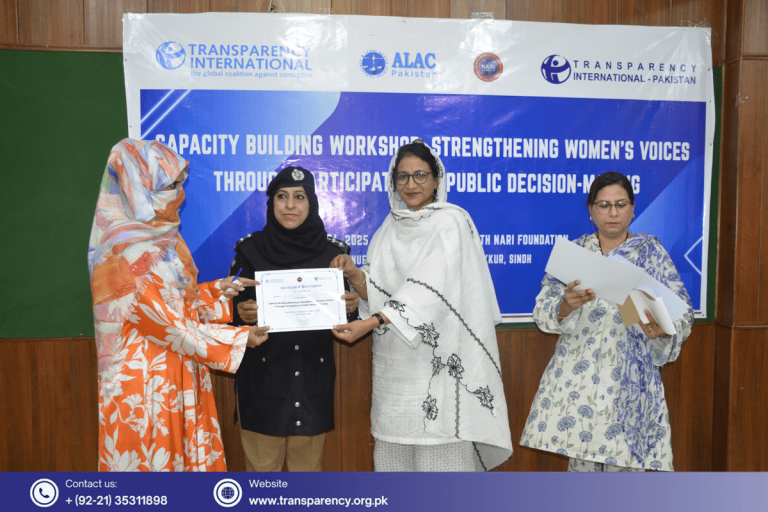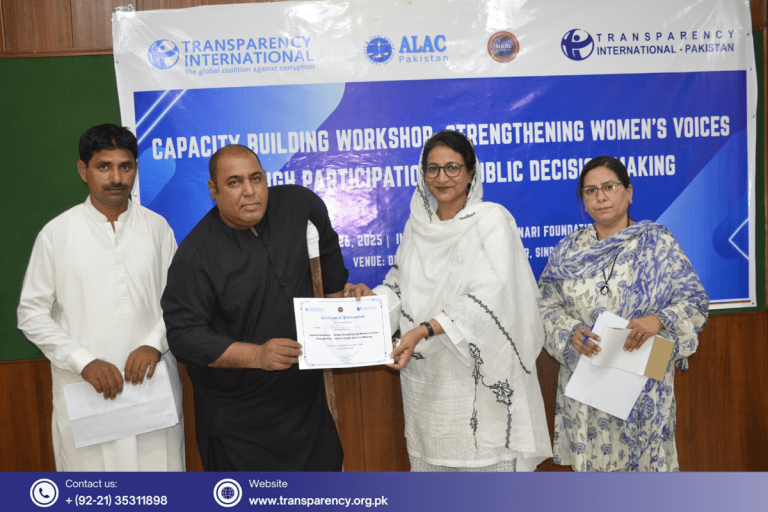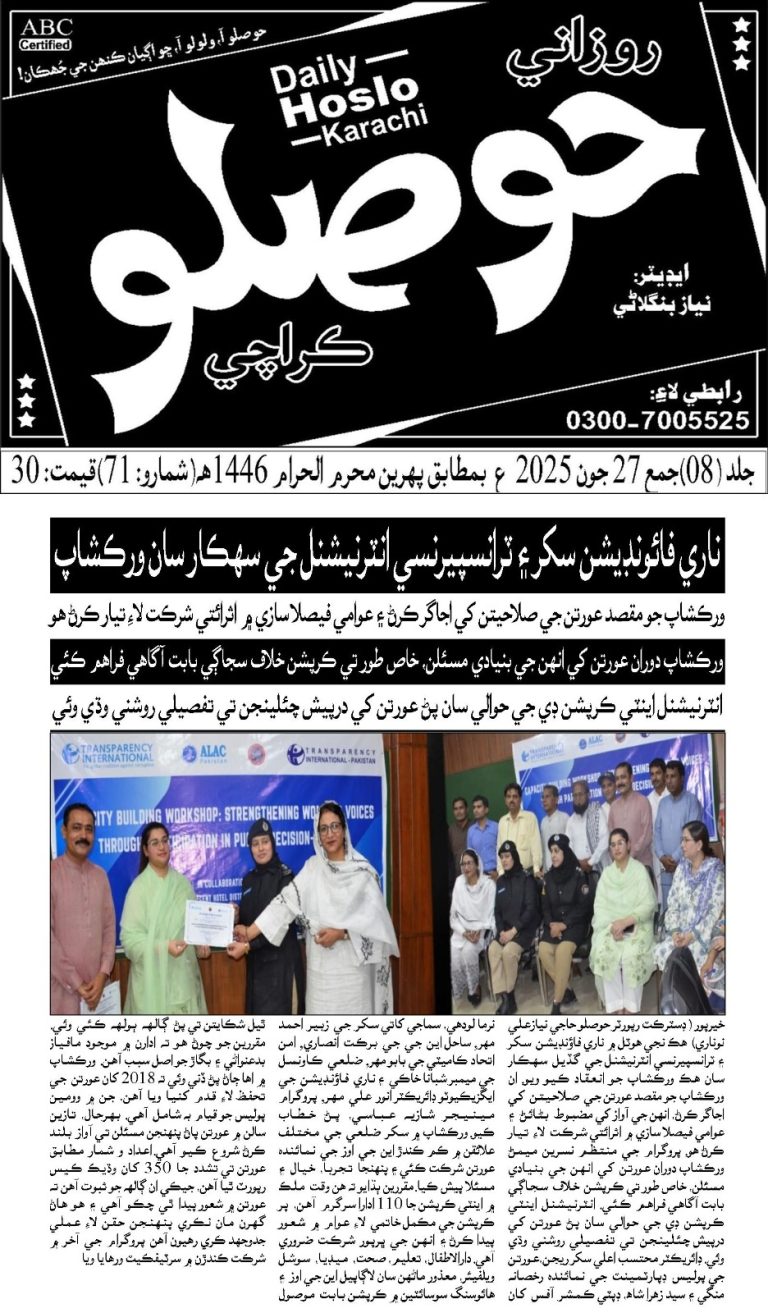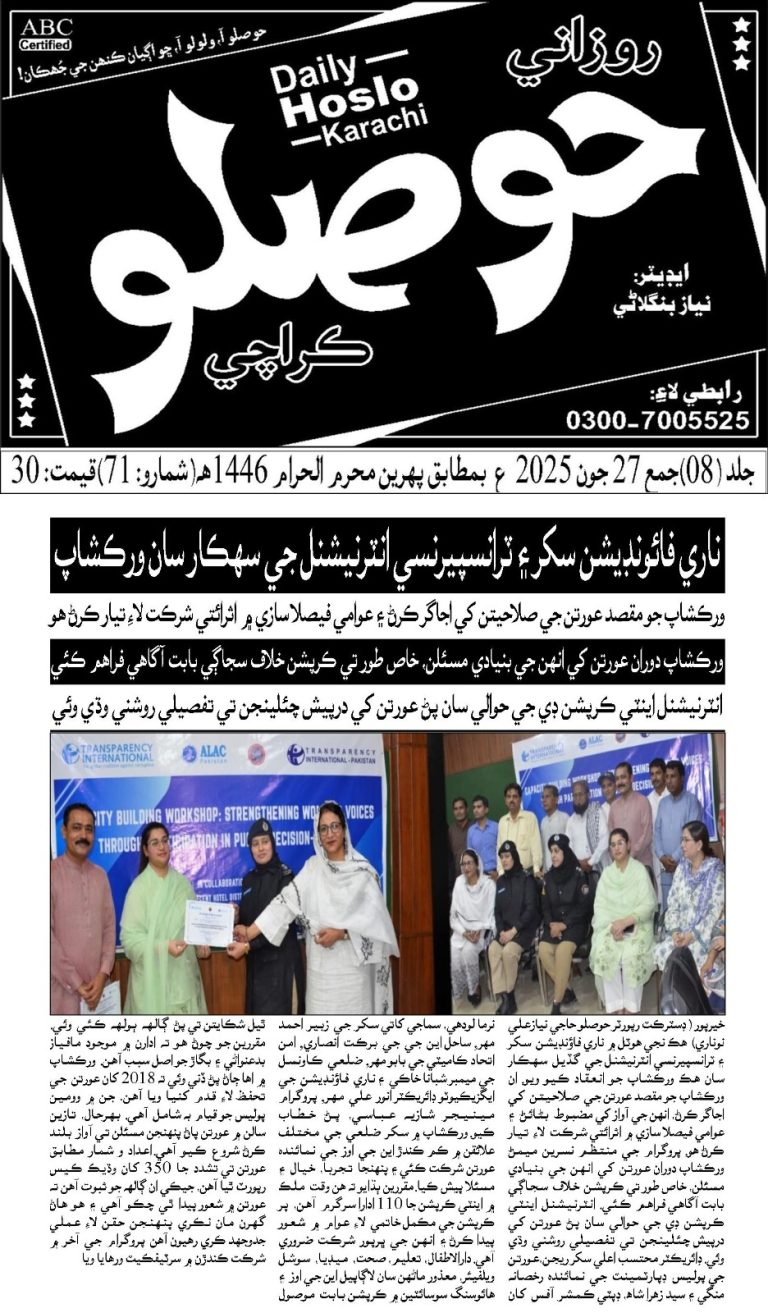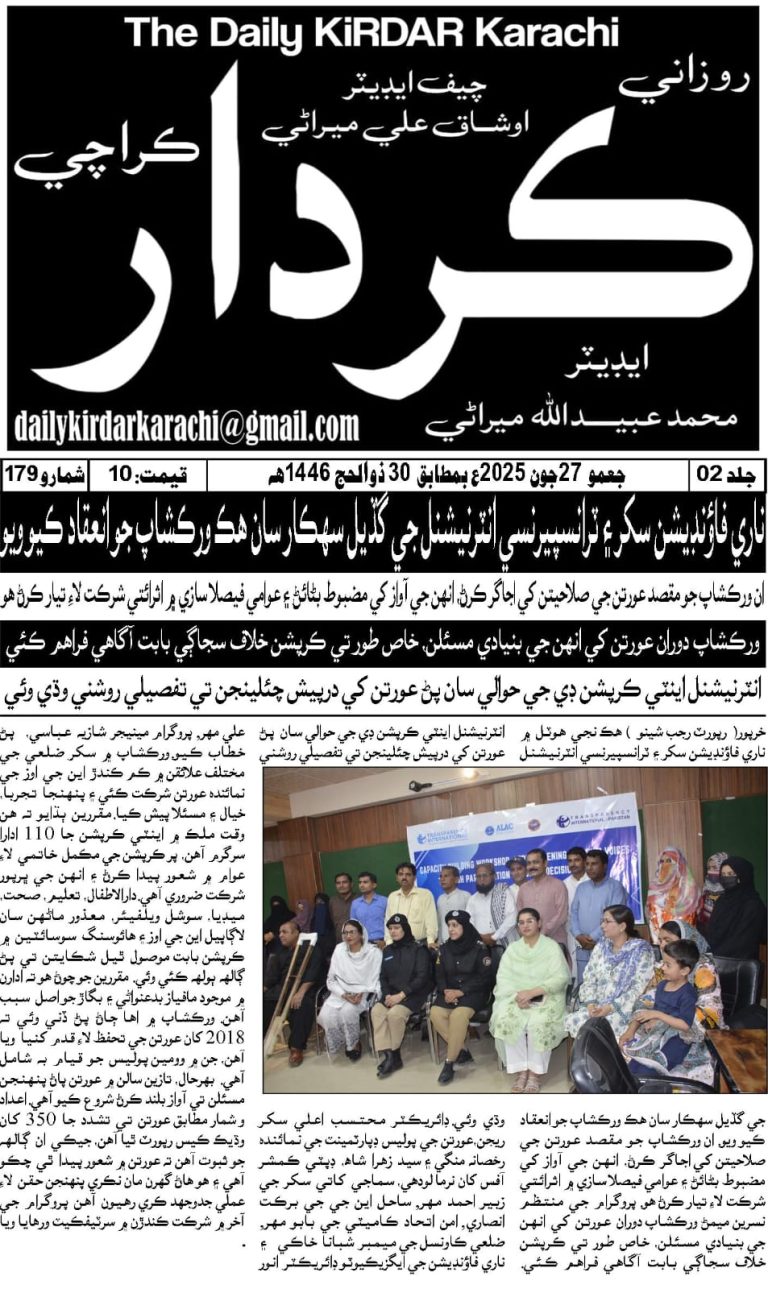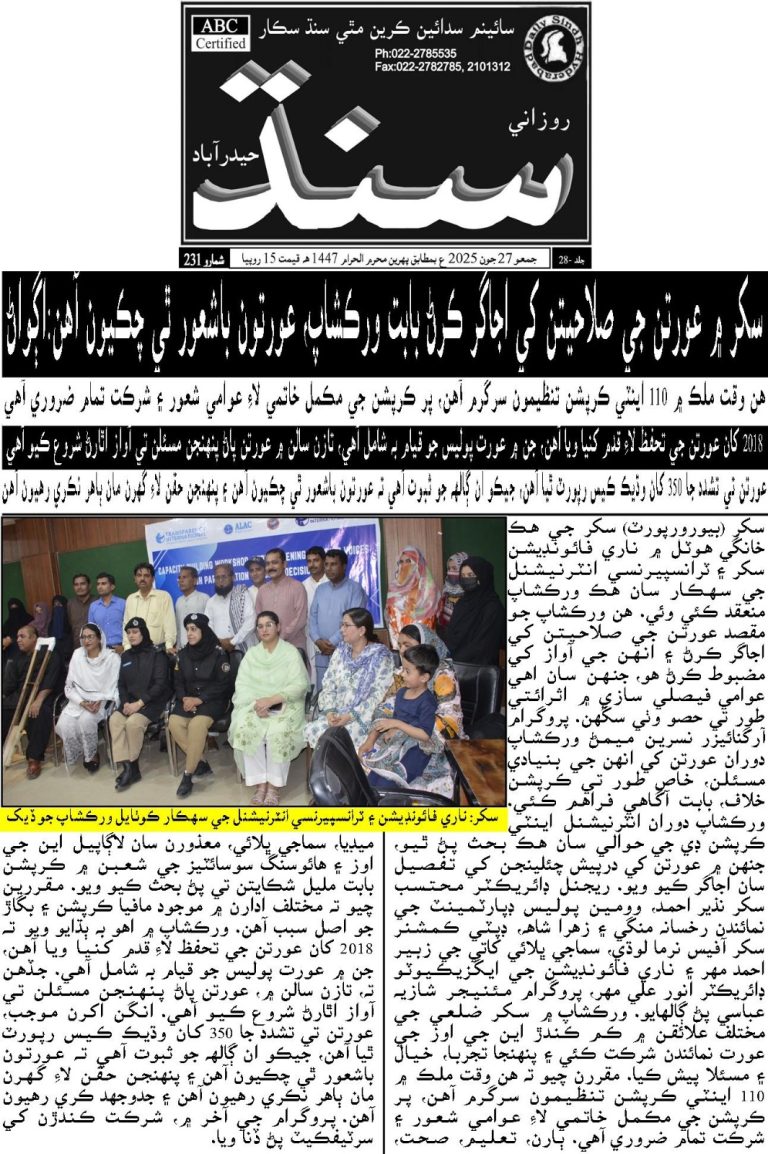Capacity Building Workshop: Strengthening Women’s Voices Through Participation In Public Decision Making.
Capacity Building Workshop: Strengthening Women’s Voices Through Participation In Public Decision Making
Date: June 26, 2025.
Venue: District Sukkur, Sindh.
Transparency International Pakistan (TI Pakistan) in collaboration with NARI Foundation, Sukkur organized a training workshop in District Sukkur, Sindh. The workshop aimed to empower women with social accountability tools, enabling their voices to be heard and their contributions to shape inclusive policies and governance frameworks within public decision-making processes.
The workshop brought together a diverse group of participants from civil society, including representatives from the Women Protection Cell, Deputy Commissioner’s office, office of the Ombudsmen and female councilor from UC Maki Shah, Sukkur.
Ms. Nasreen Memon, Gender Resource Person at TI Pakistan, welcomed the participants and provided an overview of TI Pakistan’s initiatives around women empowerment. She emphasized the importance of fostering equality, amplifying women’s voices, and equipping them with tools to lead, advocate, and drive change in their communities. She also highlighted the transformative impact of empowered women in creating inclusive and sustainable development.
At the beginning of the workshop, pre-test forms were distributed to assess participants’ prior knowledge of the session’s topics. In the first session, Ms. Rukhsana Mangi, incharge of the Women Protection Cell (WPC) Sukkur, shared insights into the cell’s proactive role in supporting female victims of violence and different forms of abuse including the gendered dimension of corruption. She noted a significant increase in women’s awareness of their rights over the past few years. The WPC offers practical solutions to women facing challenges, referring cases to police and different institutions when necessary.
Additionally, she elaborated on Sindh Domestic Violence (Prevention and Protection) Act, 2013, highlighting its critical role in safeguarding women from various forms of violence. The Act provides a legal framework to protect women from domestic, sexual, psychological, and economic abuse. The Act supports women by establishing Violence Against Women Centre (VAWCs), which offer a comprehensive support system for victims. These centers ensure access to immediate assistance, including filing police reports, registering FIRs, receiving medical care, accessing legal aid, and finding shelters all under one roof. This integrated approach guarantees that women facing violence receive timely, safe, and holistic support, empowering them to reclaim their rights and dignity.
In the next session, Mr. Nazeer Ahmed Dhoon, Regional Director Ombudsperson Sukkur, discussed the Sindh Protection Against Harassment of Women at the Workplace Act, 2012. He highlighted the importance of the Sindh Protection Against Harassment of Women at the Workplace Act, 2012, in ensuring safe and respectful workplaces. He explained that all organizations must establish inquiry committees, comprising at least one female member, to handle complaints. Employers are required to display the Code of Conduct outlining workplace ethics and consequences for harassment, including protecting against blowing whistle against unethical practices. Women can escalate unresolved complaints to the Provincial Ombudsperson, who holds powers like a Civil Court, including summoning the accused and imposing penalties. The law prohibits retaliation and ensures confidentiality to protect complainants’ dignity. Penalties for harassment range from warnings to termination. Mr. Ahmed emphasized that the law fosters justice, safety, and equality in workplaces, empowering women to work without fear.
Moving on, Ms. Nasreen Memon led a thought-provoking session on Social Accountability Tools, focusing on the Sindh Transparency and Right to Information (RTI) Act, 2016. She explained that the Sindh RTI Act grants citizens the legal right to access information held by public bodies, enabling accountability and transparency in government actions. The law applies to all public entities, including government departments, local authorities, and organizations receiving significant public funding. Public Information Officers (PIOs) are appointed to handle information requests, which must be addressed within 15 working days unless exempted for reasons such as national security, privacy etc.
She highlighted the Act’s significance for women, as it empowers them to seek information about public welfare programs, resource allocation, and employment opportunities. This helps dismantle barriers to participation in decision-making and challenges corruption and exclusion. The RTI Act is a vital tool for creating an equitable society and advocating for women’s rights.
She informed the participants about the Advocacy and Legal Aid Centre (ALAC) run by Transparency International Pakistan and provides free legal advice to women. ALAC also helps by referring cases to the appropriate authorities for resolution. Additionally, she emphasized that women can actively participate in governance and hold the government accountable by utilizing Right to Information laws.
The next technical session was on Whistleblower Protection and Mechanisms for Reporting Corruption. Ms. Nasreen provided a comprehensive overview of whistleblower protection in Sindh. She explained that in Sindh, whistleblower protection law is not currently in place but departmental rules are there to safeguard individuals who report corruption, fraud, or misconduct, ensuring they can do so without fear of retaliation. The Whistleblower Protection mechanisms are crucial for encouraging transparency and accountability in governance. She further informed the participants that such laws also protect whistleblowers from dismissal, discrimination, and harassment as a result of their disclosures. At the same time, it is important that mechanisms maintain strict confidentiality of whistleblowers, preventing identification and potential harm. She emphasized that there is a need for civil society advocacy on the enactment of whistleblower protection legislation in Sindh as such laws are crucial for protecting those who flag irregularities including highlighting gendered aspects of corruption.
The concluding remarks were delivered by Ms. Noreen Lodhi, Additional Deputy Commissioner (ADC) Sukkur. She emphasized the importance of women’s active participation in public decision-making as a cornerstone for inclusive governance. She commended the participants for their commitment to learning and encouraged them to use their knowledge and skills to advocate for their rights and contribute to policy development and implementation. She reaffirmed the government’s dedication to empowering women and ensuring their voices are heard in shaping a more equitable society.
The workshop concluded with a post-test, and certificates distribution. The Participants expressed their gratitude to Transparency International Pakistan and the NARI Foundation for fostering a supportive environment that encouraged open discussions on sensitive issues and empowered women to actively engage in public decision-making.Top of Form

